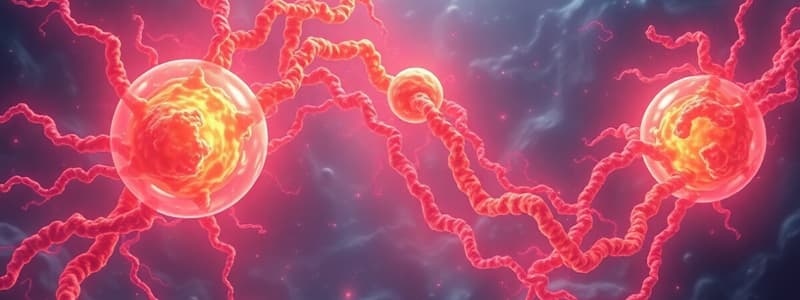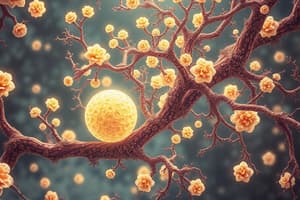Podcast
Questions and Answers
Calcium is not important for muscle function.
Calcium is not important for muscle function.
False (B)
Mitochondria absorb calcium ions and store them until needed.
Mitochondria absorb calcium ions and store them until needed.
True (A)
Calcium only has one role in cellular processes.
Calcium only has one role in cellular processes.
False (B)
Releasing calcium back into a cell can trigger hormone release.
Releasing calcium back into a cell can trigger hormone release.
Calcium is unnecessary for regulating cellular metabolism.
Calcium is unnecessary for regulating cellular metabolism.
Flashcards
Calcium's role in neurotransmitter and hormone release
Calcium's role in neurotransmitter and hormone release
Calcium plays a crucial role in the release of neurotransmitters from nerve cells and hormones from endocrine cells.
Calcium's role in muscle function
Calcium's role in muscle function
Calcium is essential for muscle function, enabling muscle contraction and relaxation.
Calcium's role in fertilization
Calcium's role in fertilization
Calcium is required for the process of fertilization, where sperm binds to the egg.
Calcium's role in blood clotting
Calcium's role in blood clotting
Signup and view all the flashcards
Mitochondria's role in calcium regulation
Mitochondria's role in calcium regulation
Signup and view all the flashcards
Study Notes
Calcium's Cellular Roles
- Calcium is crucial for numerous cellular functions.
- Calcium release triggers neurotransmitter and hormone release.
- Calcium is essential for muscle contractions, fertilization, and blood clotting.
- Mitochondria rapidly absorb and store calcium ions until needed.
- Calcium regulates cellular metabolism, steroid production, and hormone signaling pathways.
Studying That Suits You
Use AI to generate personalized quizzes and flashcards to suit your learning preferences.




